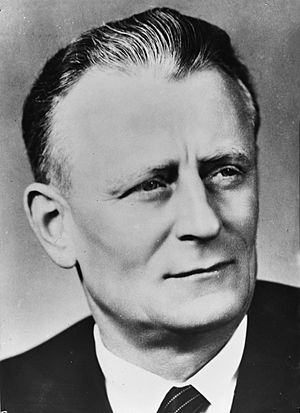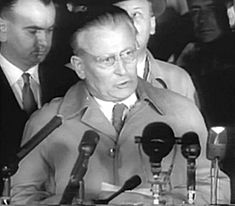Antonín Novotný facts for kids
Quick facts for kids
Antonín Novotný
|
|
|---|---|

Antonín Novotný in 1968
|
|
| First Secretary of the Communist Party of Czechoslovakia | |
| In office 14 March 1953 – 5 January 1968 |
|
| Preceded by | Klement Gottwald as Party Chairman |
| Succeeded by | Alexander Dubček |
| President of Czechoslovakia | |
| In office 19 November 1957 – 22 March 1968 |
|
| Preceded by | Antonín Zápotocký |
| Succeeded by | Ludvík Svoboda |
| Personal details | |
| Born | 10 December 1904 Letňany, Bohemia, Cisleithania, Austria-Hungary |
| Died | 28 January 1975 (aged 70) Prague, Czechoslovakia |
| Political party | Communist Party of Czechoslovakia |
| Spouse | Božena Novotná |
| Signature |  |

Antonín Josef Novotný (born December 10, 1904 – died January 28, 1975) was an important political leader in Czechoslovakia. He served as the top leader of the Communist Party of Czechoslovakia from 1953 to 1968. He was also the President of Czechoslovakia from 1957 to 1968. Novotný was known for his strict political views. He was eventually replaced by Alexander Dubček during a time of change called the Prague Spring in 1968.
Contents
Antonín Novotný: A Leader in Czechoslovakia
Early Life and Joining the Party
Antonín Novotný was born in Letňany, which is now part of Prague, Czech Republic. His family was working class, meaning they earned their living through manual labor. From a young age, he worked as a blacksmith.
In 1921, when the Communist Party of Czechoslovakia (CPC) was formed, Novotný was one of its first members. By 1929, he became a full-time worker for the Communist Party. This meant his job was to help the party grow and operate.
In 1935, Novotný was chosen to attend an important international meeting for communist parties. He became a party secretary in Prague in 1937. Later, in 1938, he worked as a secretary and editor for the party's newspaper in the South Moravian Region.
During World War II
When Nazi Germany took over Czechoslovakia in 1939, the Communist Party was made illegal. Its members had to work secretly underground. Novotný became one of the hidden leaders of the party in Prague.
In September 1941, the German secret police, known as the Gestapo, arrested Novotný. He was sent to the Mauthausen concentration camp. This was a very difficult time, but Novotný survived the camp. American soldiers freed him on May 5, 1945.
Rise to Power After the War
After World War II ended, Novotný went back to Czechoslovakia. He continued his work with the Communist Party. In 1946, he was chosen to be a member of the party's main governing group, the Central Committee.
By September 1951, he was promoted to an even higher position within the Central Committee. He became one of the party's top leaders after another leader, Rudolf Slánský, was arrested.
In February 1953, Novotný was made Deputy Prime Minister. When the party leader, Klement Gottwald, died in March 1953, Novotný became a strong candidate to take his place. In September 1953, he was named First Secretary of the party. This made him the most powerful leader in Czechoslovakia.
At first, the President, Antonín Zápotocký, and Prime Minister, Viliam Široký, wanted a less strict way of governing. However, Novotný was very firm in his beliefs and had the support of the Soviet Union. In late 1953, leaders from the Soviet Union told Zápotocký and Široký to share power with Novotný. This meant Novotný became the main decision-maker.
Leading Czechoslovakia
During Novotný's time as leader, the government still had strict rules over arts and media. However, these rules became a bit less harsh after the death of Joseph Stalin in 1953. People started wanting more freedom and changes in how the country was run. They hoped for more accountability and fair elections.
Novotný's government remained very centralized for ten years. Despite the strict rules, society changed in some ways. For example, there was a period known as the Czechoslovak New Wave, which saw many new and interesting films being made.
After President Zápotocký died in 1957, Novotný also became the President of Czechoslovakia. This gave him even more control. Three years later, in 1960, he introduced a new constitution. This new document officially stated that Czechoslovakia was a socialist state led by the Communist Party. This simply put into law what had already been happening since the Communists took power in 1948.
The Prague Spring and His Fall
In the 1960s, people in Czechoslovakia were becoming more and more unhappy. Novotný tried to make some small changes, but they were not enough. Public dissatisfaction grew, and Novotný began to lose his power.
In January 1968, he was forced to step down as the party leader. A reformer named Alexander Dubček took his place. In March 1968, Novotný was also removed from his position as president. By May, he resigned from the Central Committee of the Communist Party. This period of change and hope for more freedom became known as the Prague Spring.
Later Life
In 1971, during a time called "normalization" (when things became stricter again), Novotný was re-elected to the Central Committee. However, he had very little political power. He was also too ill to play a big role in the government led by Gustáv Husák.
Antonín Novotný died in Prague on January 28, 1975.
See also
 In Spanish: Antonín Novotný para niños
In Spanish: Antonín Novotný para niños
 | Sharif Bey |
 | Hale Woodruff |
 | Richmond Barthé |
 | Purvis Young |

